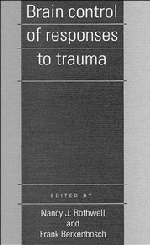Book contents
- Frontmatter
- Contents
- Contributors
- 1 Introduction
- 2 Responses to injury
- 3 Experimental approaches to the central nervous system control of responses to trauma
- 4 Neurohormonal control of cytokines during injury
- 5 Brain regions involved in modulation of immune responses
- 6 Psychological and neurobiological consequences of trauma
- 7 Central nervous system control of sickness behavior
- 8 Psychological and behavioural aspects of pain
- 9 Central control of cardiovascular responses to injury
- 10 Neuroendocrine responses to physical trauma
- 11 Central control of metabolic and thermoregulatory responses to injury
- 12 Central control of pain
- 13 The final word …
- Index
13 - The final word …
Published online by Cambridge University Press: 05 August 2016
- Frontmatter
- Contents
- Contributors
- 1 Introduction
- 2 Responses to injury
- 3 Experimental approaches to the central nervous system control of responses to trauma
- 4 Neurohormonal control of cytokines during injury
- 5 Brain regions involved in modulation of immune responses
- 6 Psychological and neurobiological consequences of trauma
- 7 Central nervous system control of sickness behavior
- 8 Psychological and behavioural aspects of pain
- 9 Central control of cardiovascular responses to injury
- 10 Neuroendocrine responses to physical trauma
- 11 Central control of metabolic and thermoregulatory responses to injury
- 12 Central control of pain
- 13 The final word …
- Index
Summary
Trauma, even when restricted to a single, specific site, has effects influencing almost every homeostatic function and body system. This diverse response might be a delight to scientists, but often proves a nightmare to the clinician faced with numerous and sometimes conflicting symptoms, which in many cases have to be considered and treated independently. We hope that such diversity has been largely represented in the topics discussed in this book, although a discussion of all possible responses to trauma which might be influenced by the central nervous system (CNS) might run to several volumes.
It has been recognised for many decades that the brain directly influences or controls certain effects of trauma, such as chronic behavioural changes, pain, cardiovascular responses and disruptions in thermoregulation. The primary concern of the clinician is the acute management of the trauma patient. However, it is increasingly apparent that these associated responses directly influence outcome. Obvious examples of this are the impact on survival of body temperature, oxygen availability and cardiovascular function. Beyond the early critical phase, CNS-controlled responses clearly have profound effects on recovery time, subsequent quality of life and independence. More surprising has been the realisation that immune function and local inflammatory responses are markedly influenced by the CNS. Indeed, perhaps there is no component of the trauma patient that is not, in some way, affected by the brain.
These discoveries and the recent findings described in the various chapters unfortunately raise as many questions as they answer, but perhaps the realisation of the complexity of the problems and the interactions within the CNS is, in itself, a major step forward. The topic of CNS responses to trauma represents an excellent example of integrated research, involving numerous discplines and a parallel growth of basic research and clinical studies. Investigation into the interactions between the brain and the immune system, and in particular the role, actions and mechanisms of actions of immune mediators such as cytokines, has greatly facilitated our understanding of the responses to trauma. Future advances are likely to benefit from further dialogue and collaboration between scientists and clinicians.
Specific pathways and mechanisms that influence the body's response to traumatic insults have been identified.
- Type
- Chapter
- Information
- Brain Control of Responses to Trauma , pp. 332 - 333Publisher: Cambridge University PressPrint publication year: 1994

